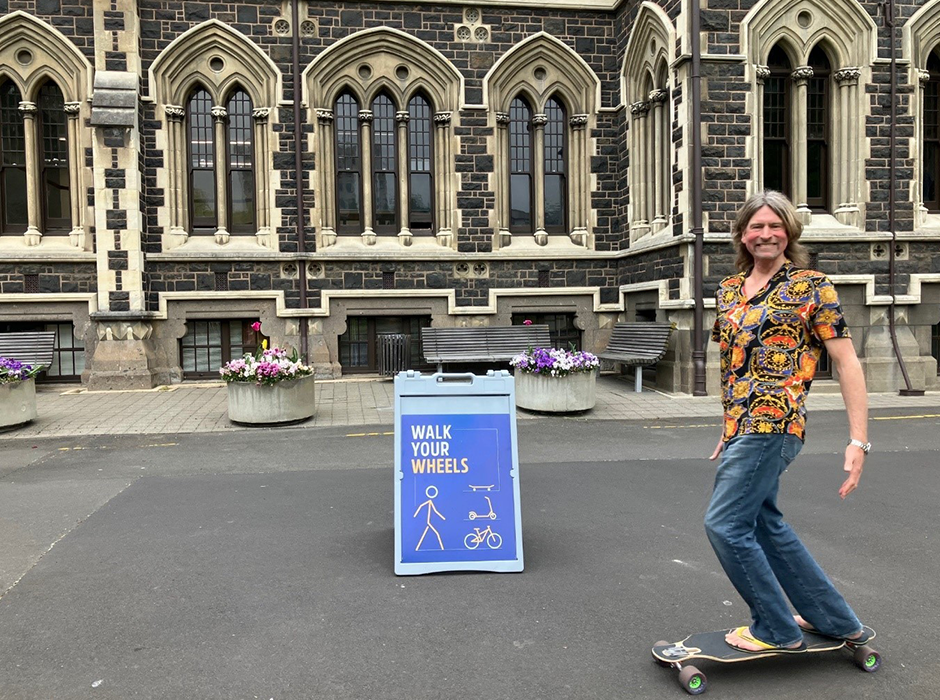
Paul posing (in a thoroughly rule-abiding stationary manner) by one of his favourite signs.
When a former Otago lecturer recently popped by campus after many years abroad, she was so cheered by the familiar vision of a fast-rolling economist that she promptly reported her sighting to a friend.
“I saw Jesus in jandals today. He’s still around. He was skateboarding through campus.”
The kinetic academic in question was Professor Paul Hansen, Department of Economics, and this description of him speaks volumes about the spirited way he’s inhabited his 36-year teaching career.
As Paul calls time on his lecturing duties to take early retirement, we take stock of his abiding passion for economics – a subject that claimed him in his early teens.
“At the age of 14, I fell in love with economics and surfing. I thought economics was so amazing – it was a lens on the world. My whole life has revolved around those two things. Marriages have come and gone but economics and surfing have stayed with me.”
His early economics eagerness didn’t go unnoticed. In the 1983 Bayfield High School yearbook, Paul’s peers listed his likely future job as ‘Professor of Economics’ (they also picked the blonde Scandinavian man in a 1980s Norsca deodorant television ad as his doppelganger).
Luckily, for the Department of Economics, Paul was diverted from his fantasy of pursuing a surfing career by the superior talents of a bunch of wave-wily youngsters.
“I wanted to be a surfer, so in 1985 I dropped out of uni to go to Australia and live on the Gold Coast. Within eight days I was back at Otago and enrolled in second-year economics because I saw 14-year-old girls over there who could surf better than anyone I’d seen in Dunedin. I also realised how boring surfing is without something else to do during the day.”
Economics offered him the perfect boredom-busting intellectual playground – and then some.
“I was always really interested in the big questions in life – how we organise our society, how we decide what we want to do, how we make ourselves happy, how we look after scarce resources. Economics is everything – and it’s not about earning bucks. I mean, I happily dress in op-shop clothes and live in a corrugated-iron crib at Long Beach.”
The direction of Paul’s teaching and research over the years was heavily influenced by British-born economist Michael Cooper who established Otago’s first health economics class in 1977.
“He turned me on to health economics – and became my friend. Without him, I wouldn’t have worked here. He backed me. I was a scruffy surfer with long hair from the wrong side of town and Michael lived in Māori Hill and wore a suit, but somehow took a shine to me.”
That interest in health economics led Paul to co-found an innovative decision-making software company in 2003 called ‘1000minds’ (more on that in the forthcoming 2024 issue of He Kitenga).
Initially conceived of to improve resource allocation in the health sector, this award-winning software soon proved clever enough to handle decision-making needs across multiple fields. Its list of clients is immense.
Once he leaves the Otago Business School, Paul will continue to problem-solve with 1000minds clients – in between catching waves – thanks to a Zoom-enabling Starlink satellite on his beachside roof.
“It’s the first time in human history that you can be both a hippie dropout and a global citizen.”
He’ll miss teaching though. The best bit?
“Those times when you share an idea and someone leans forward.”
Dr Trudy Sullivan, Associate Professor and Health Economist, Department of Preventive and Social Medicine, was one such forward-leaner.
“Paul was my lecturer in ECON306, skateboarding into the lecture in a Hawaiian shirt. He cares deeply – about what he does, about life, and especially for people. He goes the extra mile for his students, colleagues and friends – nothing is a bother. He is passionate about what he does and what he believes in and brings colour into a room – both literally and in his boisterous, enthusiastic way.”
Aleisha Lord, Teaching Fellow in the Department of Economics, concurs.
“Paul was my Economics lecturer back in 2015. At the time, ECON271 was feared by students for being a rather tough, technical course. I was very anxious about taking the paper, but meeting Paul and experiencing his gift for teaching helped change my attitude to learning over that semester. His warmth, enthusiasm and support lit up even the scariest topics and equations.
“The man is a legend.”
Kōrero by Claire Finlayson, Communications Adviser (Otago Business School)